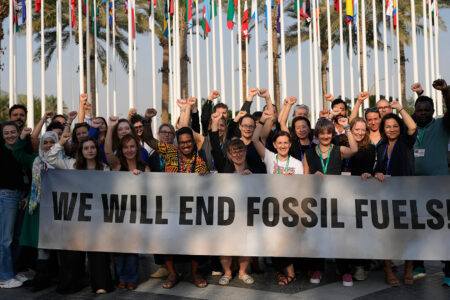
Who could have predicted that 2018 would end with Canada’s oil patch and its political allies endorsing one of the most important action items on the road to a low-carbon energy future?
“We don’t need handouts,” federal Opposition Leader Andrew Scheer told a December 19 town hall meeting in Nisku, Alberta. “We just want to get back to work.”
Quite right. Let’s make 2019 the year we do something about those handouts.
Scheer was reacting to Canadian taxpayers’ latest gift to the fossil fuel industry: a $1.6-billion financial package bestowed by the Trudeau government in response to a deeply uncertain global oil market. But give credit where it’s due. Whatever his motivation, Scheer’s comment shone a light on one of the biggest barriers to the long-term sustainable employment that Albertans and all other Canadians need and expect.
Government largesse
It doesn’t quite match with the fossil fuel industry’s carefully crafted reputation for rugged individualism and free-market capitalism. But fossil fuel subsidies date back decades, at the very least to the early 1980s and in all likelihood much farther. Fast-forward to today, and the only question is how much government largesse the industry receives each year: $3.3 billion in 2015, according to the Winnipeg-based International Institute for Sustainable Development (IISD), $5.2 billion as calculated by Oil Change International and the Overseas Development Institute, or an eye-popping US$46 billion, according to a 2015 analysis by the International Monetary Fund (IMF).
Highlights of the IISD’s inventory of routine, business-as-usual subsidies in 2015 included:
- $1.166 billion in federal exploration and development tax credits for upstream companies, those involved in oil and gas exploration and drilling;
- $1.161 billion in relief from oil and gas royalties paid to the province of Alberta;
- British Columbia’s $271-million Deep Drilling Credit for natural gas companies;
- $127 million for oil and gas operators from the federal government’s Atlantic Investment Tax Credit (AITC).
The IISD noted last year that the AITC has since been phased out, and federal tax incentives fluctuate in tandem with global oil prices; the 2018 report placed federal subsidies in the range of $1.6 billion for 2013 and 2014. Senior policy analyst Philip Gass says they’ve since fallen to about $200 million per year, though they’ll likely pick up again if global oil prices rise and Canadian fossil fuel companies restart their exploration activities.
Either way, Canada “is still the largest provider of subsidies to oil and gas production in the G7 per unit of GDP,” the report stated. And 2018 was still a banner year for the industry, with a parade of one-time supports far exceeding IISD’s earlier list. Greatest hits included:
- the $4.5 billion that Ottawa paid to Houston-based Kinder Morgan Inc. to buy out the Trans Mountain pipeline, plus the additional interest charges taxpayers will incur as a result;
- exempting about 80 percent of fossil fuel emissions from the federal carbon price;
- Alberta’s new carbon tax exemption for its oil and gas sector;
- Alberta’s decision to nearly double its Petrochemicals Diversification Program to $1.1 billion from $600 million, allocate another $500 million to petrochemical feedstock infrastructure and spend $1 billion over eight years on heavy oil upgrading;
- the $5.35-billion package of tax incentives that British Columbia introduced to sweeten the deal for the consortium, led by Royal Dutch Shell, behind the $40-billion LNG Canada megaproject, supported by $1.275 billion from Ottawa;
- making federal Finance Minister Bill Morneau’s new Accelerated Investment Incentive available for oil and gas;
- Alberta’s decision to buy a new fleet of oil trains to get another 120,000 barrels per day of crude oil to market —followed by Trudeau’s statement that Ottawa would consider helping with the purchase;
- $260 billion in unfunded liabilities from Alberta’s oil and gas facilities that will become a taxpayer subsidy to whatever extent the original owners walk away from their responsibilities.
Then there’s the inconvenient reality that Canada’s financial backing for fossil fuel producers through the Export Development Corporation exceeded its support for clean technology companies by 12-fold between 2012 and 2017 — a period when the world’s clean-tech markets were getting serious, and Canada was falling behind in an emerging global race.
After all of that, what a relief to hear Andrew Scheer’s rallying cry that “we don’t need handouts.”
Tallying the full cost
The subsidies that federal and provincial taxpayers shell out directly to fossil fuel companies are just one part of the picture. The IMF’s methodology factors in many of the indirect costs that communities incur as a result of fossil fuel production and use — and not necessarily all of them, since a calculation issued in 2015 would miss the intensive research on climate change impacts that has been published since. The difference is enough to boost the annual estimate from C$3.3 billion (or considerably more in 2018) to US$46 billion.
“The upward revision is partly due to factoring in new World Health Organization estimates on harm to health from pollution exposure…The bulk of energy subsidies in most countries are due to undercharging for domestic environmental damage,” the IMF explained at the time, “including local air pollution — especially in countries with high coal use and high population exposure to emissions — and broader externalities from vehicle use like traffic congestion and accidents.”
The IMF’s tally for global fossil fuel subsidies: US$5.3 trillion, or more than $10 million per minute, every minute of the year.
The larger number brings together a longer list of shifting parameters that fall outside the traditional energy system. The IISD’s figures point to a simpler, more attainable policy target that governments should be eager to address, particularly as they look back at two signature events in 2018: the landmark UN report that set an immutable, 12-year deadline to cut humanity’s greenhouse gas emissions by 45 percent, and the Trudeau government’s decision to buy us all a pipeline.
Which brings us to the other half of Andrew Scheer’s comment in Nisku, where he channelled some very old, wise thinking about community economic development in precisely the wrong direction. “Give a province $1.6 billion [and] you might feed them for a couple of weeks,” he said. “Let them build a pipeline to get our energy to market and you can feed them for a generation.” The lines were adapted from a widely cited proverb about building resilience and self-sufficiency — exactly the opposite of what happens to communities caught on the roller coaster of a declining global fossil fuel market.
In 2009, G20 countries meeting in Pittsburgh affirmed that “inefficient fossil fuel subsidies encourage wasteful consumption, distort markets, impede investment in clean energy sources, and undermine efforts to deal with climate change.”
That’s as big a problem now as it was then. Yet Canada is still throwing good money after bad, propping up an industry that must enter a managed decline in a carbon-constrained world.
So it’s good to see the fossil fuel industry agreeing that it shouldn’t need handouts. Until now, Andrew Scheer would not have been anyone’s idea of an advocate for a rapid transition away from fossil fuels and the carbon pollution they produce. But as 2019 dawns, he should be held to his word and should give some careful thought to the meaning behind those words.
Photo: Shutterstock: pan demin
Do you have something to say about the article you just read? Be part of the Policy Options discussion, and send in your own submission. Here is a link on how to do it. | Souhaitez-vous réagir à cet article ? Joignez-vous aux débats d’Options politiques et soumettez-nous votre texte en suivant ces directives.






